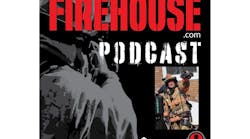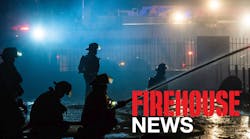Planning must begin with the realization that it can happen anywhere. No fire department, regardless of size, is immune from the possibility that it will suffer a line-of-duty death. Last year, more than 100 firefighters were lost in cities, suburbs, small towns and rural areas. They belonged to career, combination and volunteer fire departments; some were young, while others were veterans who had served for many years. And, each loss left permanent scars on their families, their departments and their fellow firefighters.
As a director and vice chairman of the National Fallen Firefighters Foundation (NFFF), I have learned that several things must happen simultaneously whenever a firefighter dies in the line of duty. Obviously, there has to be an aggressive and impartial investigation to determine what went wrong so that steps can be taken to prevent it from happening again. We cannot accept the idea that firefighters' deaths are inevitable, even though we know that the work is inherently dangerous. If there is nothing new to be learned - which often is the case - then the old lessons have to be forcefully re-emphasized.
Along with that, we must honor the memory of our fallen comrades and do everything we can to support and comfort their families. A solemn and dignified memorial service, with a huge turnout of uniformed firefighters, can start the healing process for a family and the entire department. But it's only a start and there is much more to be done in the difficult weeks, months and even years that lie ahead.
The plan should include professional counseling, not only for the family members, but for firefighters and chief officers as well. We have learned through experience that counseling should be provided by experts who are trained to deal with the fire-rescue service. These are professionals who have an understanding of firefighters, their families and the unique world in which they live. It can be more of a problem in small towns and rural areas, where they have not had any previous experience in line-of-duty deaths or may lack some of the resources that are available in urban areas. However, the NFFF can provide a list of counselors in every part of the country who have worked with fire departments.
One of the important elements is "peer support" for the families and chief officers. The NFFF sponsors programs in which family members and fire chiefs who previously suffered a line-of-duty death are available to personally and privately share their experiences with those who need help. A family may not be ready to accept this help in the first few weeks or months after their loss, but at some point they may feel the need and be receptive to peer support. Many have told us how helpful it is to share their thoughts and problems with someone who has been through the same ordeal they are facing.
Taking care of a family's financial needs is another crucial element in preparing for a line-of-duty death. The plan must include contacts for all of the resources that can provide money on a short- and long-term basis. A certified line-of-duty death makes a firefighter's family eligible for the federal government's Public Safety Officer's death benefit, which is administered by the Department of Justice and currently amounts to $146,000. There also are local organizations that provide immediate cash for funeral and other emergency expenses.
The benefits paid by state and local governments vary greatly and may depend on a department's size and whether it is career or volunteer. Some provide generous benefits, including scholarships for children as well as monetary payments. Other states have no benefits and, incredibly, some take care of police officers' families, but do nothing for firefighters. There is a glaring need for funds to provide scholarships and vocational training for widows who suddenly have to go to work to support their families. The Foundation is attempting to compile a state-by-state list of benefits and has started its own scholarship fund for the children and spouses of fallen firefighters, but much more is needed.
Last year, the NFFF began its "Taking Care of Our Own" training program to help senior officers prepare their departments for line-of-duty deaths. It has been well received by more than 100 fire officers who have attended the six-hour course and it will be presented 10 times this year at various locations around the country. It is taught by chiefs, chaplains and counselors who have had personal experience in dealing with line-of-duty deaths. One of those involved is New Orleans Chief Warren McDaniels, who points out: "We need to plan for serious injuries or deaths the same as we plan for hazmat and other major incidents."
(For more information on the "Taking Care of Our Own" training program, write to the National Fallen Firefighters Foundation, P.O. Drawer 498, Emmitsburg, MD 21727, or telephone 301-447-1365.)
Families also should be encouraged to attend the National Fallen Firefighters annual memorial service, which is held in early October at the National Fire Academy. And, if possible, they should be accompanied by an escort of firefighters from their own department. Most of those who attend tell us that the memorial service and the weekend seminars, in which they share their experience with other fallen firefighter families, helps bring closure to their ordeal and gives them renewed strength to go forward with their lives.
We can never forget the loss of a firefighter, but we can learn how to live with it by honoring their memory, supporting their families and doing everything we can to prevent it from happening again.
Hal Bruno, a Firehouse® contributing editor, is a retired political director for ABC News in Washington and served for 40 years as a volunteer firefighter.




